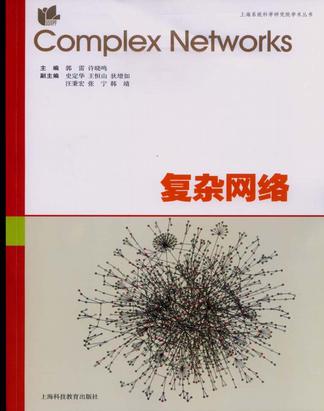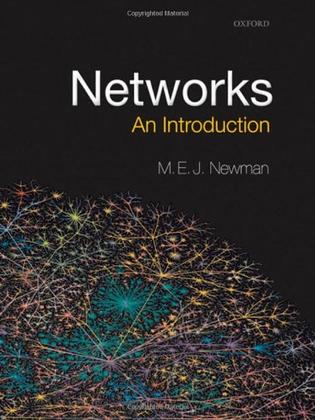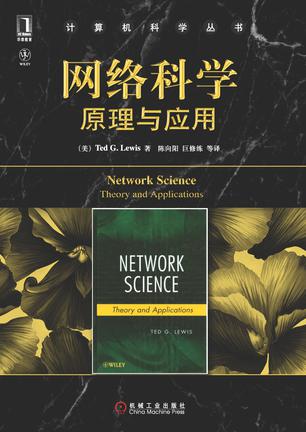-

复杂网络
-

Networks
The scientific study of networks, including computer networks, social networks, and biological networks, has received an enormous amount of interest in the last few years. The rise of the Internet and the wide availability of inexpensive computers have made it possible to gather and analyze network data on a large scale, and the development of a variety of new theoretical tools has allowed us to extract new knowledge from many different kinds of networks. The study of networks is broadly interdisciplinary and important developments have occurred in many fields, including mathematics, physics, computer and information sciences, biology, and the social sciences. This book brings together for the first time the most important breakthroughs in each of these fields and presents them in a coherent fashion, highlighting the strong interconnections between work in different areas. Subjects covered include the measurement and structure of networks in many branches of science, methods for analyzing network data, including methods developed in physics, statistics, and sociology, the fundamentals of graph theory, computer algorithms, and spectral methods, mathematical models of networks, including random graph models and generative models, and theories of dynamical processes taking place on networks. -

网络科学
网络科学作为一门新兴的学科越来越引入瞩目。网络科学能帮助读者设计更快、更有弹性的通信网络;能用于调整电力网络、电信网络和飞行航线等基础设施系统;可以为市场动态建模;能帮助理解生物系统中的同步;能用于分析人们之间的社会互动…… 这是第一本全面审视新出现的网络科学的论著。书中研究了各种网络——规则网络、随机网络、小世界网络、影响网络、无标度网络和社会网络等,并将网络过程和行为应用于涌现、传染病、同步和风险方面。本书的独特之处在于将跨计算机科学、生物学、物理学、社会网络分析、经济学和市场营销等多学科的专业概念整合了起来。 本书为网络科学领域提供了全新的理解和阐释,是研究人员、专业人员以及工程、计算、生物领域的技术人员不可缺少的参考资料,也可以作为相关领域研究的高年级和研究生教材。 -

传播网络理论
《传播网络理论》2003年由牛津大学出版社出版,并获得20113年国际传播学会组织传播分会的年度最佳著作奖《传播网络理论》不仅抓住了传播中核心的网络问题,系统介绍了网络分析方法和工具,更为重要的是透过网络结构本身,深入分析了网络结构的生成机制问题,探讨了网络研究涉及的社会理论基础 书中提出了多理论多层次的网络研究框架,应用复杂适应系统观点分析传播网络并构建计算机仿真环境以验证各种理论与假设 书中还探讨了传播网络与其他网络的关系,为通过计算机仿真方法研究动态组织结构涌现提供了基础。 -

Smart Mobs
How the convergence of mobile communications and computing is driving the next social revolution-transforming the ways in which people meet, mate, work, buy, sell, govern, and create. When Howard Rheingold sneaks off down an untrodden trail, everyone else follows. He is always onto something marvelous no one has seen before. An ever-considerate guide, he navigates this new world with ease, compassion, and grace, and gives you the inside story, with no punches pulled. Tech talk? Howard could get your mother to understand. From Tokyo to Helsinki, Manhattan to Manila, Howard Rheingold takes us on a journey around the world for a preview of the next techno-cultural shift-a shift he predicts will be as dramatic as the widespread adoption of the PC in the 1980s and the Internet in the 1990s. The coming wave, says Rheingold, is the result of super-efficient mobile communications-cellular phones, personal digital assistants, and wireless-paging and Internet-access devices that will allow us to connect with anyone, anywhere, anytime. From the amusing ("Lovegetty" devices in Japan that light up when a person with the right date-potential characteristics appears in the vicinity) to the extraordinary (the overthrow of a repressive regime in the Philippines by political activists who mobilized by forwarding text messages via cell phones), Rheingold gives examples of the fundamentally new ways in which people are already engaging in group or collective action. He also considers the dark side of this phenomenon, such as the coordination of terrorist cells, threats to privacy, and the ability to incite violent behavior. Applying insights from sociology, artificial intelligence, engineering, and anthropology, Rheingold offers a penetrating perspective on the brave new convergence of pop culture, cutting-edge technology, and social activism. At the same time, he reminds us that, as with other technological revolutions, the real impact of mobile communications will come not from the technology itself but from how people use it, resist it, adapt to it, and ultimately use it to transform themselves, their communities, and their institutions. -

網絡社會之崛起
本書解釋了今日重塑世界的兩股強大但相互衝突的潮流:全球化與認同。資訊科技的革命以及資本主義的再結構已經引動了網絡社會,並帶來了策略,除經濟行為的全球化、工作的彈性化與不穩定,以及真實的虛擬文化。但是,伴隨著資本主義的轉化與國家主義的消亡而來的,是集體認同的表達以火力十足的方式竄起。它們挑戰了全球化中的文化單一性以及對於生活、環境的控制。曼威.柯司特在本書中描繪了社會運動的根源、目標以及效果,包括了諸如女性主義與環境主義,這些試圖在最基本的面向上轉化人類關係的主動性的社會運動;以及奉神、國家、種族、家庭或地方之名而進行防禦工事的反應性的社會運動。 作者認為,在科技一經濟勢力與轉化性的社會運動,這兩者藉由媒體的新生力量來造勢並進行混合與矛盾的攻勢下,這個世界既有的分類模式已經飽受威脅。作者認為,處於這些對立的潮流的夾縫中,國族國家出現問題,政治民王的概念本身也面臨危機。作者的主題涵蓋了美國、西歐、俄羅斯、墨西哥、玻利維亞、回教世界、中國以及日本等地,藉此探討與理解各種不同的社會過程,作者也指出這些多樣化由社會過程之間,有緊密相關的意義與功能。 如果要理解這個世界如何地從本世紀的開頭已經邁入的轉變,這本書具有不可或缺的重要性。